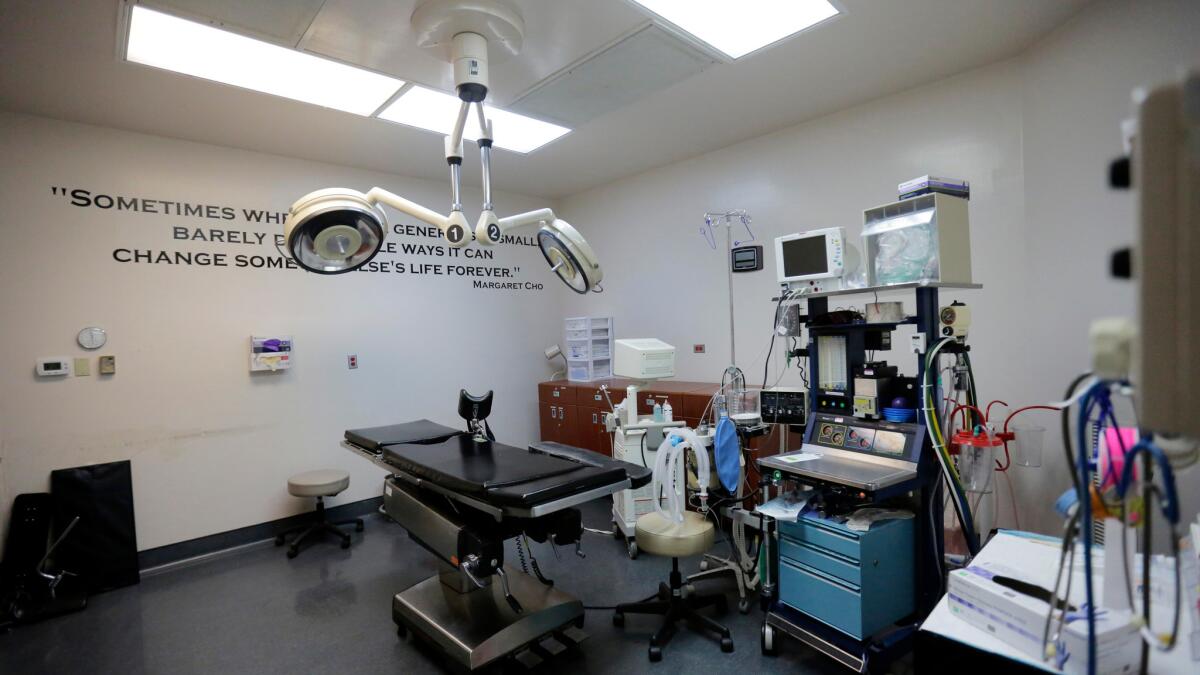Here’s what happened when Texas cracked down on abortion clinics
Reporting from Houston — In the year after Texas adopted a restrictive new abortion law, two trends surfaced quickly.
The number of women who were able to obtain medication to induce abortions plunged 70%. At the same time, the number of women who underwent the actual surgical procedure increased, even though more than half the state’s abortion clinics had closed.
The immediate effects of the 2014 law – which was deemed unconstitutional in a landmark Supreme Court ruling this week –are reflected in figures released Thursday by the Texas Department of State Health Services.
NEWSLETTER: Get the day’s top headlines from Times Editor Davan Maharaj »
More than 11,200 fewer women got drug-induced abortions after the law was adopted, partly because they faced added restrictions on getting abortion pills, faced longer appointment wait times, had to travel farther to see doctors and were often racing the clock, providers said. Texas law at the time said women could not receive the medication if they were more than seven weeks pregnant.
“The numbers demonstrate the devastating effect House Bill 2 had on the women of Texas,” said Trisha Trigilio, staff attorney for the ACLU of Texas, referring to the legislation that restricted access to abortions.
Wait times for medication abortion began to improve last March after the Food and Drug Administration relaxed guidelines for taking the drug, guidelines the Texas law had relied on in requiring women to consult the same doctor multiple times over the course of several days. The new guidelines decreased the number of visits a woman had to make to a doctor from three to two, and extended the period when she can take the pill from the first seven weeks of pregnancy to the first 10 weeks.

HB2 also required, among other things, that doctors at abortion clinics obtain hospital admitting privileges and that the clinics upgrade their facilities to become ambulatory surgical centers. The Supreme Court on Monday found that those requirements created an “undue burden” for Texas women, especially those who live hundreds of miles from the nearest clinic.
After the law passed, more than half of the state’s 41 abortion clinics closed, including some that served Latino areas along the Mexican border and in West Texas. Abortion rights advocates have said they will try to reopen some of the clinics, but that it could take years to build or lease facilities, hire staff and obtain state licenses.
The figures show there were about 14% fewer abortions in Texas in 2014 compared with the year before, while the number of Texas women getting abortions out of state increased about 11%. Abortion providers have reported Texas women driving to clinics in Kansas, Louisiana, Oklahoma and New Mexico.
Abortions decreased most in 2014 for Latinas, followed by African Americans, figures show.
The number of medication abortions – as opposed to surgical – dropped sharply, from 16,189 to 4,938. Surgical abortions, meanwhile, increased about 7%. Providers said that the new, more restrictive state law prompted more women to have surgical abortions.
State officials released provisional abortion figures for 2014 earlier this year but delayed releasing the final figures. The ACLU of Texas accused the state of delaying the release for political reasons. The state denied the accusation.
“Given the overall drop in abortions – especially in vulnerable communities along the border – as well as the precipitous 70% drop in medication abortions, these numbers show that this law never had anything do with women’s health,” Triglio, the ACLU attorney, said. “It’s clear why lawmakers might have wanted to keep this information out of the public eye before the Supreme Court made its decision.”
The law affected minorities in both rural and urban areas, especially those along the border and in other remote areas of the state, the figures show. About 1,100 fewer women had abortions in Houston’s surrounding county in 2014 compared with 2013, with more than half of the decrease among Latinas.
In West Texas’s Lubbock County, where an abortion clinic closed after HB2 passed, the number of abortions dropped 32%, while in Hidalgo County on the Mexican border, where a clinic also closed, the number of abortions dropped by more than half.
ALSO
Key passages from the Supreme Court’s abortion decision
Supreme Court strengthens right to abortion, strikes down Texas restrictions on clinics
How the two justices from California are moving the Supreme Court to the left
More to Read
Sign up for Essential California
The most important California stories and recommendations in your inbox every morning.
You may occasionally receive promotional content from the Los Angeles Times.









